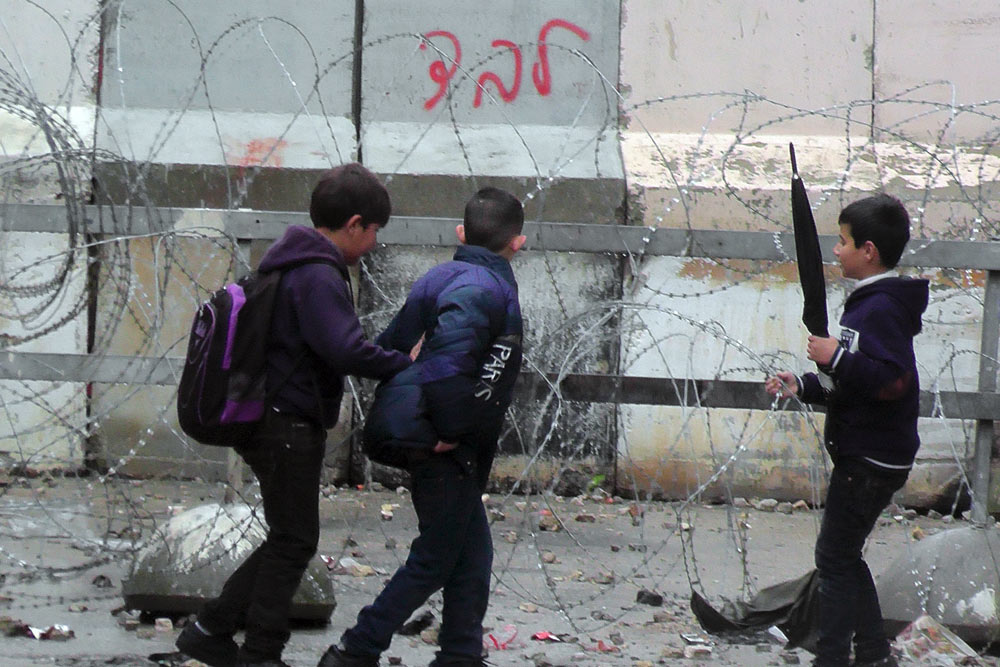General Synod resolution seeks end of ill-treatment of Palestinian children
 Each year, an estimated 500 to 700 Palestinian children are arrested by Israeli military personnel, charged with a crime and prosecuted in a military court system instead of a civilian court. A group of United Church of Christ congregations, along with a network of Israel-Palestine peace advocates, seek to end what they say is a “traumatic” practice and will ask the denomination to speak out on behalf of children of Palestine.
Each year, an estimated 500 to 700 Palestinian children are arrested by Israeli military personnel, charged with a crime and prosecuted in a military court system instead of a civilian court. A group of United Church of Christ congregations, along with a network of Israel-Palestine peace advocates, seek to end what they say is a “traumatic” practice and will ask the denomination to speak out on behalf of children of Palestine.
A resolution to this summer’s 31st General Synod in Baltimore (June 30-July 4), brought forward by 16 individual UCC churches, would call on the state of Israel to guarantee these children their basic due process and to prohibit any use of torture or ill-treatment of detained juveniles in the Israeli occupied territories of the West Bank (including East Jerusalem) and Gaza.
Members of the UCC Palestine-Israel Network (UCC-PIN), a grassroots group of UCC ministers and lay leaders seeking a just peace between the two peoples, felt that the treatment of children in the occupied territories is “one of the most egregious violations of the occupation,” said Angelica Harter, part of the UCC-PIN Steering Committee, which initiated the resolution.
The Rev. John Buttrick, who chairs UCC-PIN, said that everyone in the group has some form of connection with Israel-Palestine. “They know people there and have traveled there, and it’s become obvious with the way children are treated in the occupied territories that we had to bring this forward,” he said. “I learned it personally in 2010, living in the West Bank for three months as an Ecumenical Accompanier [with the World Council of Churches].”
Among the resolution’s other calls, should it pass: For the UCC General Minister and President to communicate the resolution with Israel’s Prime Minister and the U.S. Ambassador to Israel, and with U.S. government officials; for the U.S. government to hold aid given to Israel, about $3.1 billion annually, to determine if it complies with the Foreign Assistance Act and isn’t used for human rights abuses; and for the U.S. to ratify the United Nations Convention on the Rights of the Child, which 194 other countries — including Israel in 1991 — have ratified.
Harter and Buttrick both believe the U.S. government’s policies toward Israel haven’t shifted greatly between presidential administrations. But this latest resolution would contribute to the movement to pressure the U.S. and Israeli governments to adhere to internationally recognized human rights standards and laws, while shedding a light on the occupation’s impact, now in its 50th year after Israel took control of the West Bank and Gaza Strip in 1967.
“It’s a way of educating churches and members as to how the occupation is carried out — in this case with children being arrested in the middle of the night and brought in blindfolded, interrogated without their parents or a lawyer present, and held in solitary confinement,” Buttrick said.
A report by the U.S. State Department released in March highlighted the actions Buttrick described, along with others — including the denial of fair trials for Palestinian children, and unlawful killing and excessive use of force by Israeli forces. The report also mentioned an increase in the detention of minors in 2016, and continual use of confessions signed by Palestinian minors, written in Hebrew.
Harter believes that those details highlight two different legal systems in the same territory. Jewish children living in settlements in the occupied territories who are arrested are prosecuted through civil courts because they are citizens of Israel. And Israeli officials are no longer releasing figures on how many children they are detaining, stopping publication of such data in in May 2016, according to Defense for Children International Palestine, a Palestinian human rights organization focused specifically on child rights.
“It makes it appear that the use of military law and the way Palestinian children are treated are a way to control the population as a whole,” Harter said. “The military interrogates children about their family and friends, and gathers information that way.”
Other denominations in the United States, including the Presbyterian Church (USA) and conference of the United Methodist Church, have passed similar resolutions to the one coming to General Synod. Meanwhile, the Christian Church (Disciples of Christ) is considering an identical resolution at its General Assembly this summer.
The resolution needs votes from two-thirds of the Synod delegates for adoption.
Related News
A Prophetic Call for Justice and Peace in Palestine
The executive leaders of the United Church of Christ have issued the following statement...
Read More‘Love is Greater Than Fear’: Regional Youth Events get to the heart of gospel message
United Church of Christ teens attending this summer’s Regional Youth Events (RYE) are...
Read MoreUCC desk calendars available to order now
Prepare for your day, month and year with the United Church of Christ desk calendar —...
Read More


